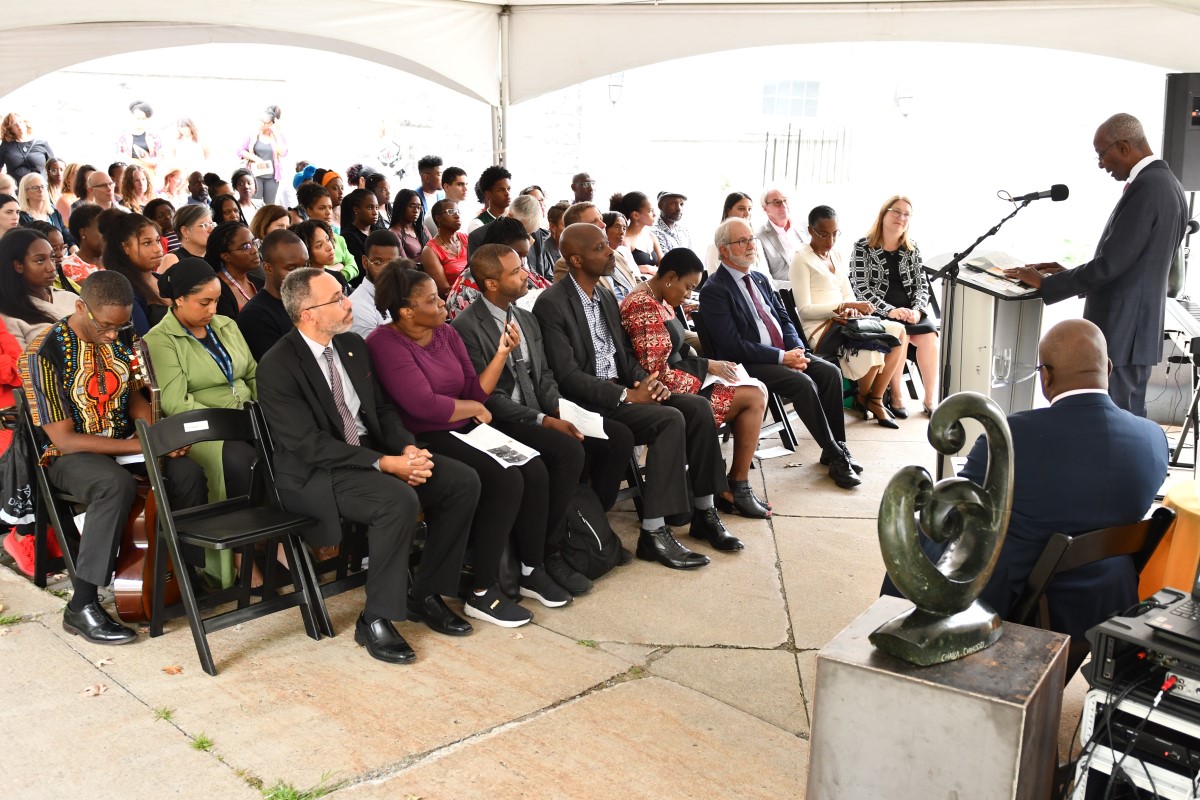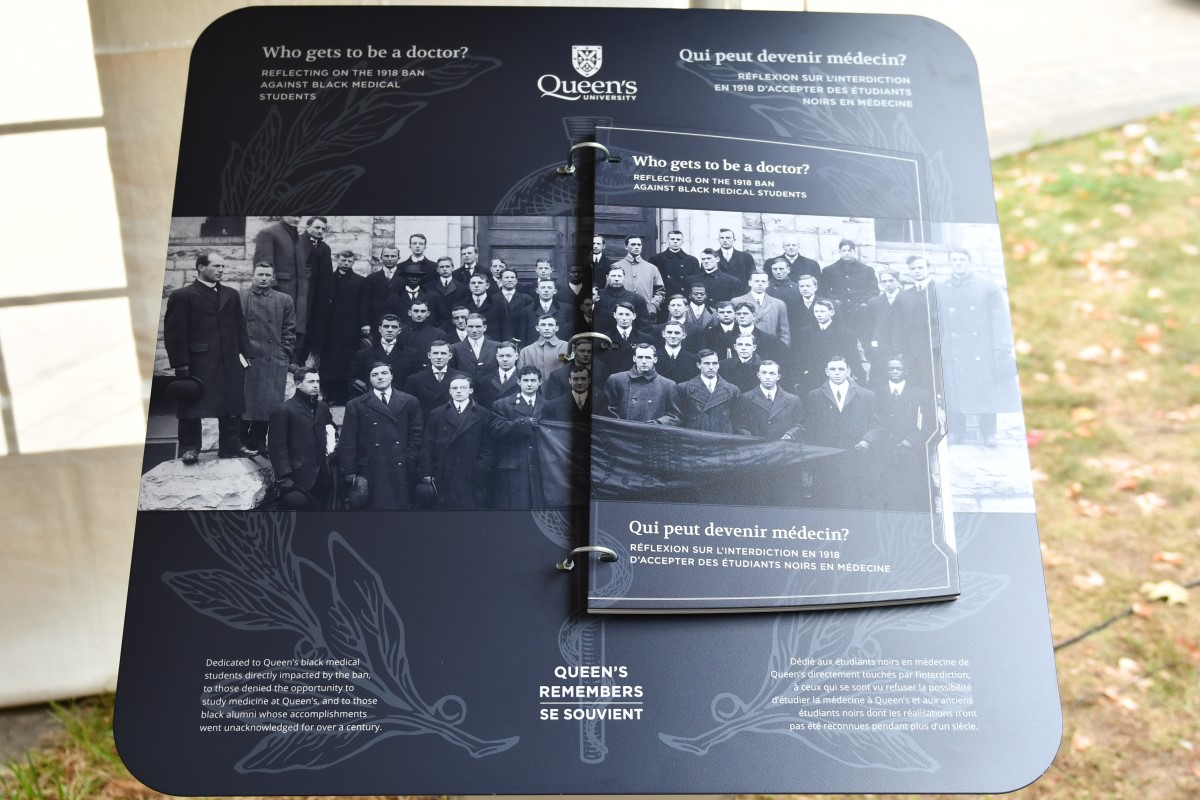Members of the Queen’s, Kingston, and Canadian medical communities gathered to mark the unveiling of a new Queen’s Remembers plinth commemorating those impacted by a 1918 ban that prevented the admission of Black students to Queen’s medical school up until 1965. In 2019, the university moved to confront its past actions, issuing a formal apology for the racist policy in an official ceremony and committing to ongoing efforts to support Black student access to, and success in, medical professions.
“Today, we honour the Black medical students who were pressured to leave, and denied entry to Queen's medical school during this ban,” says Principal and Vice-Chancellor Patrick Deane. “It was a great injustice that altered their futures and the course of their lives and careers. This plinth, like others on campus, enhances our understanding of the university's history for community members and visitors to campus.”
The ban’s impacts stretched further still, serving to perpetuate racism and health inequities.
“This ban robbed these students of their dreams and pursuits as healthcare professionals, and impacted an untold number of others who would have benefited from their example and service,” says Jane Philpott, Dean, Queen’s Health Sciences (QHS). “Furthermore, it helped cement a broad legacy of racism in the medical profession that has jeopardized health and hindered equitable healthcare. This is a past we must know and continually confront, to evolve this crucial vocation into one that is increasingly inclusive, diverse, and just.”
Moving toward greater representation
The unveiling event was held in the Medical Quadrangle – an outdoor space adjacent to several buildings that once comprised the Faculty of Medicine’s earliest facilities – where the permanent plinth is erected. Oyedeji Ayonrinde, Associate Professor of Psychiatry and Chair of the Commission on Black Medical Students, served as master of ceremonies. He discussed the legacy of the ban and the formal apology and highlighted the gathering as a moment to acknowledge the past, recognize the present, and look with hope toward the future.

“With respect and dignity, this monumental reparative event honours the Black medical students egregiously excluded and banned by Queen’s.” says Dr. Ayonrinde. “We are enamoured by the Black community of Kingston and beyond for their family spirit of support, and look to the future with accountable hope.”
Since the public apology, QHS has initiated several changes to help increase Black medical student representation within the faculty. The Commission on Black Medical Students was established and has worked to support and mentor Black medical students, staff, and faculty, and curriculum is in place that aims to educate MD students about the ban and its wider impacts. Currently, 14 Black medical students are studying at Queen’s – the highest number of Black medical students enrolled at one time in more than a century.
“As Black medical students, being able to commemorate our forefathers is a bittersweet reminder of what was, and what has now become,” says Sabra Salim, Co-President of the School of Medicine Class of 2025. “By commemorating the difficulties our predecessors met, we are reminded that our existence as Black learners is joyful resistance.”
“I am hopeful that today marks the beginning of an era for Queen’s – one marked by radical action towards making Queen’s a nurturing environment for Black learners,” says Grace Ayoo, MD student in the Class of 2026 and President, Aesculapian Society.
Community, regional, and national support
Members of Kingston's Black community presented Principal Deane with an original sculpture created in honour of the event by artist Chaka Chikodzi. The piece entitled “Honour. Dignity. Hope.” will be installed in the School of Medicine (SOM) building.
The presidents of Black Physicians of Ontario and Black Physicians of Canada were also among the day’s distinguished speakers and guests, and they presented Dean Philpott with a commemorative plaque listing the names of students enrolled at the time of the 1918 ban which will also be hung in the SOM building.
“The past is behind us but not forgotten. It’s ours to fix the wrong for a better today and a best tomorrow.” says Modupe Tunde-Byass, President, Black Physicians of Canada. “Black Physicians of Canada was founded in 2020, after the death of George Floyd. Our mission is to support, unite, and empower Canadian Black physicians and physicians in training like those in the audience today to amplify the Black voices and experiences within the Canadian health system.”
Lanval Daly (Meds'71), the second Black medical student admitted to Queen’s following the ban, was a keynote speaker.
“My journey represents the indomitable spirit that has driven generations of Black students to overcome adversity and excel in their pursuits,” says Dr. Daly. “This plinth does more than just recognize the past. It stands as a beacon of hope for future generations, reminding us that education should be a universal right, devoid of discrimination. It is a reminder that even in the face of adversity, perseverance and dedication can bring about monumental change. The steps we take today echo through time, offering a brighter path for those who follow.”

Students and community members underscored the significance of the day’s events through several musical and dance performances between speakers and at the conclusion of the ceremony.
Efforts are campus-wide
Since the apology, the university has moved to increase Black representation, access, and support across faculties, units, and institutional governance as well.
University administrators also made a declaration of commitment to address systemic racism in 2020, initiating immediate steps and pledging ongoing actions. The following year, Queen’s became a signatory to the Scarborough Charter, a sector-wide agreement to confront anti-Black racism and promote Black inclusion across key priority areas. The university also launched a Black Studies program and hired several new faculty members in support.
“We have dedicated ourselves to this vital work but there remains much to be done,” says Stephanie Simpson, who was recently appointed to the newly-created Vice-Principal (Culture, Equity, and Inclusion) role. “With social tensions increasingly visible across the globe, we have a responsibility to stand firmly against racism and bigotry in all of its forms, and to be an example of the inclusive, diverse, and equitable future we know is possible.”

Visit the Queen's Health Sciences website to learn more about its commitments to equity, diversity, and inclusion, or read more about the Queen’s Remembers series of plinths.
Article originally published in the Queen's Gazette.